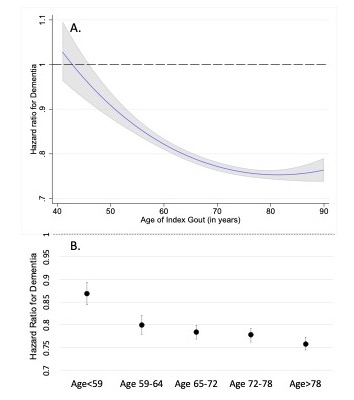Session Information
Date: Sunday, November 17, 2024
Title: Metabolic & Crystal Arthropathies – Basic & Clinical Science Poster II
Session Type: Poster Session B
Session Time: 10:30AM-12:30PM
Background/Purpose: Prior studies reported a lower risk of dementia among patients with gout suggesting that hyperuricemia might play a neuroprotective role. However, risk estimates for dementia can be biased for exposures that are associated with a higher risk of death and require greater consideration of the potential for survival bias and competing risks (Chang et al.). We evaluated the risks of dementia for patients with gout, compared to controls, stratifying by age to evaluate the potential impact of survival bias. We hypothesized that any protective effect of gout would be of greater magnitude at older ages.
Methods: Patients with gout and matched controls (up to 1:10 based on age, sex, index date, and year of VA enrollment) were identified within the VA Corporate Data Warehouse using validated algorithms. Demographics, medications, comorbidities, and healthcare utilization over the past year were extracted from medical record data. Several pre-specified patient characteristics and any additional characteristics that differed between groups (standardized difference >0.05) were included in regression models. We required the youngest age category to have at least 10% of the total events. Cox proportional hazards models evaluated the association between gout and the risk of dementia, censoring for death or loss to follow-up. A pre-hypothesized interaction between gout status and age category was tested and illustrated.
Results: The analysis included 533,465 patients with gout and 4,935,717 controls. There were 417,459 incident cases of dementia over 46,131,189 person-years of follow-up. Patients with gout were significantly different from controls in many characteristics considered in analysis. In adjusted models, the risk of dementia was lower for patients with gout [HR: 0.79 (95% CI: 0.78, 0.79) p< 0.001]. However, the risk estimate varied by age group, with a lower HR for oldest age group [HR: 0.76 (0.74, 0.77) p< 0.001] compared to the youngest [HR: 0.87 (0.84, 0.89), p< 0.001] (p for interaction < 0.001) (Figure). The effect approached a HR of 1 at an index age of 40. In stratified models, the HR for other known risk factors also varied by age category. For example, smoking was more strongly associated with dementia in the youngest age group [HR: 1.46 (1.42,1.50), p< 0.001] compared to the oldest age group [HR (95% CI): 1.13 (1.11, 1.15) p< 0.001].
Conclusion: The estimate of association between gout and dementia varied widely by age, with a more protective effect of gout noted at older ages. While this could reflect modification of the causal effects of gout by age, these observations are also what would be expected in the presence of survival bias. Individuals with or at risk for gout that die prematurely may also be the most likely to have developed dementia, had they survived long enough. These results call into question prior literature in this area and suggest that more advanced methods to appropriately account for the competing risk of death are needed to accurately assess the causal risks of gout and hyperuricemia in epidemiologic studies.
Chang CC, et al. Smoking, death, and Alzheimer disease: a case of competing risks. Alzheimer Dis Assoc Disord. (2012)
To cite this abstract in AMA style:
Baker J, Helget L, Chang c, England B, Coburn B, Sayles H, Roul P, Mikuls T. Risk of Dementia in Patients with Gout: Potential Impact of Survival Bias [abstract]. Arthritis Rheumatol. 2024; 76 (suppl 9). https://acrabstracts.org/abstract/risk-of-dementia-in-patients-with-gout-potential-impact-of-survival-bias/. Accessed .« Back to ACR Convergence 2024
ACR Meeting Abstracts - https://acrabstracts.org/abstract/risk-of-dementia-in-patients-with-gout-potential-impact-of-survival-bias/

